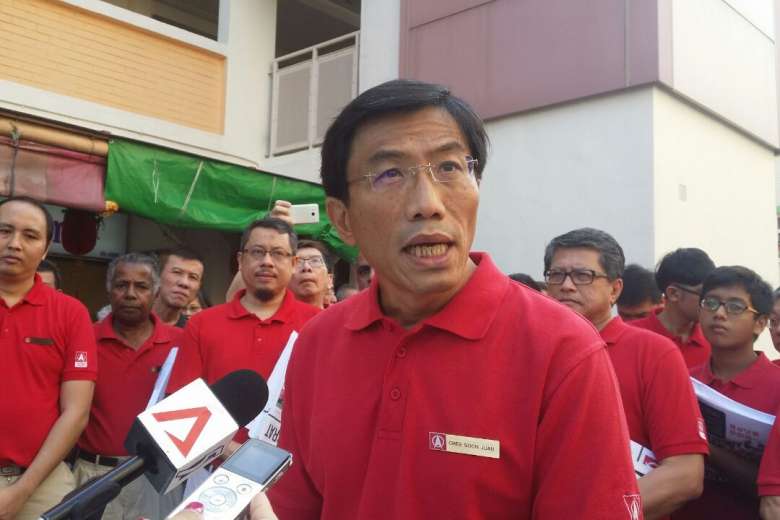Singapore Democratic Party (SDP) secretary-general Chee Soon Juan has reiterated his concern over the Comprehensive Economic Cooperation Agreement (CECA) between Singapore and India, in the wake of the viral incident involving an India-born condo resident berating a security guard.
While the condo resident – who is now a naturalised Singapore citizen working in a top position at JP Morgan in Singapore – has since apologised to the security guard, the incident thrust CECA into the spotlight.
Progress Singapore Party chief Tan Cheng Bock’s promise to call for a review of CECA and Workers’ Party politician Gerald Giam’s parliamentary exchange with ex-Trade and Industry Minister Lim Hng Kiang over CECA began trending on social media, after the video went viral.
In a Facebook post published yesterday (30 Oct), Dr Chee joined those expressing concern over CECA. Pointing to the climbing unemployment rate and the growing number of retrenchments, he wrote:
“Latest MOM Q3 figures show retrenchments and unemployment all going up, and it’s harder for the retrenched to find new work. The PAP makes the situation a whole lot worse by signing agreements like CECA.”
According to preliminary data gathered by the Ministry of Manpower (MOM) for the third quarter of 2019, the number of retrenchments and the unemployment rate has continued to rise. MOM said last week that the number of retrenchments in the third quarter of 2019 came in at 2,900, which is notably higher than the 2,320 retrenchments that were recorded in the preceding quarter.
Similarly, the unemployment rate also went up. Overall, the unemployment rate went up from 2.2 per cent to 2.3 per cent while the unemployment rate for Singapore residents (including permanent residents) went up from 3.1 per cent to 3.2 per cent.
In his post, Dr Chee linked a video the SDP produced last year about the changes to CECA. His caption to the video, that was published in June last year, stated: “The PAP keeps asking S’poreans to upgrade our skills but keeps bringing in foreigners.”


https://www.facebook.com/cheesoonjuan/posts/10159567552798849?__xts__%5B0%5D=68.ARDhwpF7_4NiNMXXmdsNkaTBfHWiE1YBRduc9sJG1h0t1RHvjpphwenxQmfFqoMgyfeo7G2-YgfMJ9i-322viRip10IzE8rCEb2ksYluR9p4_2FwwIb9UH5PqOVuBRNuDJhzj-NW-UnXYd3RhgtPiT1TgwSUZQ72aeOTPdPcsB18ASAkmbmYXsFqq0fa1ArCnFISb4iir_qUpkjBy1jqwA4nVqCBoGLTw8CZgb5Zp1Z47Qa6vSTRfcGam-REbhV_hcxUs-7bUwb1FLYZEEr8rTVo__c543OL_LOtgR4GVqvAHBfOqzppFLjrwbQegF5-P2W1dcvDkhl421sQ1r4HzXkA_2TwJPEpSpSYIbRcMGLvcedJ97x5XNGpjA2nojOzYfSY8P8khNWWJJi9lQJSeDRwD4NUR-BaTjsWNtku3pOvhm4smgqBZFwMou3lCKkyf3JHBchF4g5NclyK-16b1bzd3QKxhr1aMDFmOSabe6QjMW64I8N_&__tn__=-R
In the agreement, Chapter 9 provides for the movement of people between the 2 countries. In particular, it provides very laxed rules for the so-called “intra-corporate transfer” of employees from 127 sectors. These employees shall be exempted from any labour market testing or economic needs testing, as specified in Article 9.3.
To top it all off, CECA Article 9.6 even allows the “intra-corporate transferees” to bring in their spouses or dependents to work too. In cases where their spouses or dependents are not professionals, they shall be allowed to work in other areas.
CECA led Indian IT companies like Wipro or Infosys to exploit the “intra-corporate transfer” loophole and move a large number of Indian IT workers into Singapore since CECA does not set any quotas and since they do not have to hire a single Singaporean in their Singapore-based subsidiaries.
When unemployment rates for Singaporean PMETs climbed and when Singaporean workers began to complain of discriminatory hiring practices at such firms, the Government responded and began to slow down the approvals of Indian IT professionals to work here.
This did not sit well with the Indian Government.
Times of India reported that work visas for Indian IT professionals to work in Singapore have dropped “to a trickle”, prompting the Indian government to put on hold the review of CECA, citing violation of the trade pact.
In particular, the Indian Government was against Singapore using our “fair consideration framework” to regulate the employment of foreigners in Singapore. “They are doing it despite the CECA clearly stating that there will be no ENT (economic needs test) or quotas on agreed services. This is a violation of the agreement,” warned an Indian official.
That was in 2017. In 2018, Singapore and India successfully concluded the second review of the CECA in the presence of PM Lee and his Indian counterpart Narendra Modi.
The second review of CECA was concluded with no change to the chapter on movement of people and was instead expanded to officially recognise Indian nursing degrees and includes tariff concessions for more products.
Tan Cheng Bock’s promise to call for a review of CECA agreement trends online
Number of retrenchments and unemployment rate continues to rise: Latest MOM labour market data

